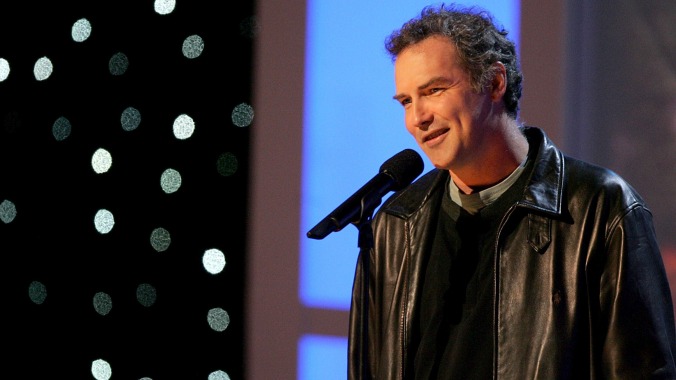Norm Macdonald told jokes, dammit
Norm Macdonald hated anti-comedy, and it's what made his style so original

The late, great Norm Macdonald was not an anti-comic. There was no revealing of artifice or hoity-toity subtext that would encourage the audience to see through the facade of stand-up comedy. He didn’t subvert expectations so that crowds could see the red light behind them, warning the comedian on stage that their time was almost up. Nor did he deliver jokes that were so intentionally stupid, dull, or offensive that they only appealed to the back of the room. He told jokes and got laughs, with his matter-of-fact delivery and stunning vocabulary that was as disarming as it was gut-busting. He could tell one-liners no problem, but the real gold was his long walks. The way he set up a joke made it difficult to even get to the punchline because Norm decorated his work with detailed characters, situations, and atmosphere that were enough to leave audiences or, in many cases, late-night hosts gasping for air. But when Norm finally made his way through the shaggy-dog story and got around to dropping the punchline, it never disappointed. Whether it escalated or deflated the joke, Norm’s work never dissatisfied. You could call him the anti-anti-comic’s comic if that weren’t so stupid.
Norm’s comedy almost defied description. It was deadpan and anticlimactic, just not in the ways we’re used to hearing. He wasn’t Steven Wright or Andy Kaufman; though, it probably wouldn’t be controversial to compare him to those two greats. Anticlimax usually implies anti-catharsis, wherein the ending grants one the opportunity of placing their thumb and index finger under their chin to ponder the moments that led up to the conclusion. Anticlimax can turn art into a rhetorical question, one that can be intriguing but is rarely funny. Everyone loves hearing about the times Kaufman took the stage only to read aloud from The Great Gatsby; very few would want to sit through it. Conversely, any self-respecting comedy fan would kill to see Norm do the “moth joke” live. But there was something about the way Norm built to a joke, carefully lining the golden road to the punchline that made the most nonsensical, corniest punchline even funnier (see: The Comedy Central Roast Of Bob Saget). Whatever Norm said was the funniest option.
There’s a reason that so many people consider him the best Weekend Update anchor in the history of Saturday Night Live—even if the late NBC executive Don Ohlmeyer disagreed. In a 2018 profile, Macdonald told the New York Times Magazine, “We were doing experimental stuff, non sequiturs. Ohlmeyer would watch Leno kill every night for 15 minutes. Every joke, huge laughs, and then I’d do 10 minutes a week and sometimes not get laughs.” You can’t hear laughter through a TV screen. So every weekend at midnight, he would puncture the veneer of celebrity and the objectivity of news media with off-center jokes that sometimes ended with the setup restated, like when Julia Roberts realized she was married to Lyle Lovett. Only Norm could get away with something that seems so simple on paper and so impossible in execution. It can’t be that easy. It shouldn’t be that easy. But for Norm, it was.
On SNL, Macdonald began working Frank Stallone into his act. Stallone is the younger sibling of the much more famous Sylvester Stallone, which is not to say that Frank doesn’t have his own showbiz career to speak of—he’s released eight albums and appeared in dozens of movies (many that weren’t directed by his brother!). But to 10-year-olds watching SNL at home in 1996 (one of the show’s many supposed bad years), Stallone was a non sequitur that always killed. “According to the EPA, it will cost an estimated $295 million to clean up toxic waste at the former Lockheed Martin military aircraft plant in California,” went one quintessential setup. “The cause of the toxic waste? You guessed it, Frank Stallone!” Stallone would become the scapegoat for numerous environmental, economic, and political disasters throughout Norm’s Weekend Update tenure. With Stallone’s headshot appearing as the over-the-shoulder image, the joke didn’t need to make sense for Macdonald to sell it. The surprise was enough for Norm—or more specifically, the fact that it was funny was enough for him.












![HBO teases new Euphoria, Larry David, and much more in 2026 sizzle reel [Updated]](https://img.pastemagazine.com/wp-content/avuploads/2025/12/12100344/MixCollage-12-Dec-2025-09-56-AM-9137.jpg)



























